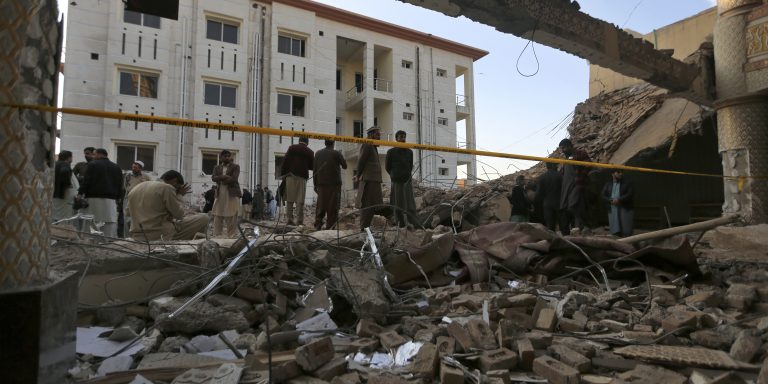INTELBRIEF
February 3, 2023
IntelBrief: Pakistan Braces for New Wave of Violence in Wake of Peshawar Suicide Attack

Bottom Line Up Front
- More than 100 people were killed and more than 200 wounded in a suicide attack targeting a mosque frequented by law enforcement in the city of Peshawar, Pakistan earlier this week.
- The attack was initially claimed by two Tehrik e Taliban Pakistan (TTP) leaders, though a group spokesperson later denied TTP’s involvement.
- Though TTP propaganda has explicitly encouraged attacks on Western soil, the organization said it had limited its aims to Pakistan in 2020.
- The attacks come after a ceasefire between Pakistan’s government and the TTP ended in November.
More than 100 people were killed, and more than 200 wounded, following a suicide attack by or Pakistani Taliban, targeting a mosque in the northwestern city of Peshawar in Pakistan earlier this week. The attack, which took place on a police compound that also housed government buildings, was reminiscent of the extreme volatility that plagued the country between 2009 and 2014, when jihadist militant groups launched terrorist attacks with relative impunity. Casualties included many members of the Pakistani security services, especially police and government officials. The attack was initially claimed by two officials of the Tehrik-e-Taliban Pakistan (TTP), also known as the Pakistani Taliban, before being refuted by the group’s spokesperson. It offered a stark reminder of the potency of the TTP, which has gained strength by regrouping across the border in Afghan safe havens since the Taliban’s takeover in 2021. The disputed claim also suggests a possible rift within the group. Militant groups, particularly those with ties to Afghanistan and the Afghan community across the border, have often used Peshawar to offer sanctuary to Afghan mujahedin and foreign fighters, including Osama bin Laden and al-Qaeda, in their war against the Soviets, from 1979 to 1989.
The TTP was formed in 2007 under a broader umbrella of militant groups and over time, the organization grew by recruiting with ruthless efficiency. Subsequent Pakistani military offensives could not dislodge the group from its strongholds along the Afghanistan-Pakistan border, where its fighters often operated alongside al-Qaeda terrorists and members of the Haqqani network. Even several high-profile decapitation strikes – including one which killed the group’s first leader, Baitullah Mehsud, in 2009 and Hakimullah Mehsud in 2013 – have failed to degrade the TTP’s operational capabilities significantly. However, the group did see a decline due to various factors between 2014 and 2018. The TTP was linked to the failed terrorist attack by Faisal Shahzad in New York City in 2010, in which the vehicle-borne improvised explosive device Shahzad was using failed to detonate. On numerous occasions, TTP propaganda has explicitly encouraged attacks on Western soil, with TTP leadership directly threatening both the United States and the United Kingdom, although the group announced in 2020 that it would limit the scope of its aims to Pakistan.
The Pakistani government has accused the TTP of assassinating the country’s former prime minister, Benazir Bhutto, in 2007, and the TTP attempted to assassinate youth activist Malala Yousafzai in 2012. Two years later, the TTP claimed responsibility for an attack on a school operated by the military that claimed nearly 150 lives, almost all of whom were school-aged children. This attack led to another aggressive Pakistani military onslaught to crush the group and turned public opinion firmly against militant groups.
In 2018, the group released a manifesto which called for the de-prioritization of targets unaffiliated with the Pakistani military or intelligence services, leading to a sharp decline in attacks on civilians. At various points, the government in Islamabad, with the support of the military and intelligence services, attempted to broker a truce with the TTP, only to watch each ceasefire break down and a resumption of attacks by the militant group. The most recent ceasefire was negotiated between the Pakistani government and the TTP by the Afghan Taliban, which served as a mediator. Ever since that truce ended in November 2022, the TTP has been increasing its operational tempo. Relations between the government in Pakistan and the Afghan Taliban are growing more acrimonious and are expected to deteriorate further. Along with terrorist attacks, its members have engaged in mafia-style shakedowns and extortion attempts of individuals and businesses to raise money. In the past, the militants have engaged in systemic kidnapping for ransom operations and other illicit activities, including smuggling and trafficking, to earn revenue.
TTP leaders remain based in Afghanistan while its mid-level commanders and foot soldiers remain entrenched throughout Pakistan’s lawless Khyber Pakhtunkhwa region, a rugged stretch of terrain that Pakistan’s military has never been able to pacify successfully. Critics claim that Pakistan’s government has been too distracted by ongoing political and economic turmoil to focus on securing the population from terrorist attacks. Thousands took to the streets of Waziristan in January to demand that the government stabilize the region amidst an increase in terrorist activity. Pakistan is supposed to hold elections by October of this year and ousted Prime Minister Imran Khan has been at odds with longtime political fixture Nawaz Sharif, pitting Khan’s Tehreek-e-Insaf party (PTI) against Sharif and a coalition of allies that include Sharif’s brother Prime Minister Shahbaz Sharif (who replaced Khan as prime minister) and Bilawal Bhutto Zardari, the current Minister of Foreign Affairs and head of the Pakistan People’s Party. In addition to the threat posed by the TTP, Pakistan is also recovering from disastrous flooding that occurred in September 2022, as well as other terrorist-related threats, such as that posed by the Balochistan Liberation Army, which has increasingly targeted Chinese nationals and business interests in Pakistan over the last decade, and instability in a region that has witnessed violence and movements for independence for over seven decades and an insurgency movement that has gained momentum since 2019.